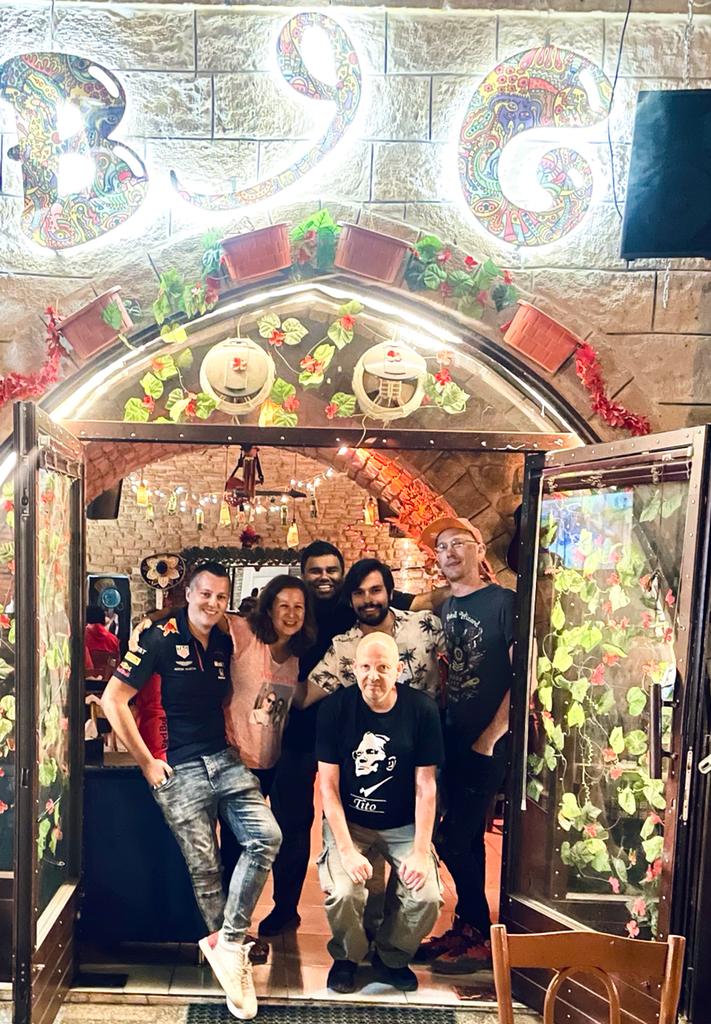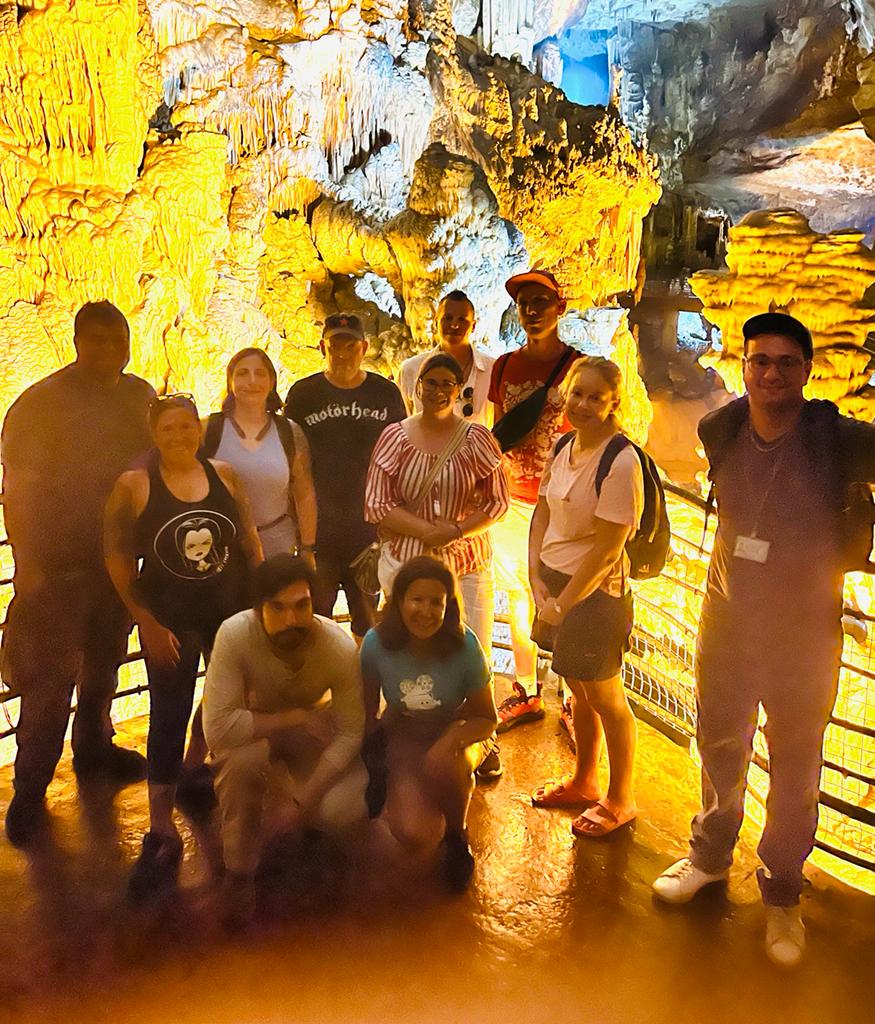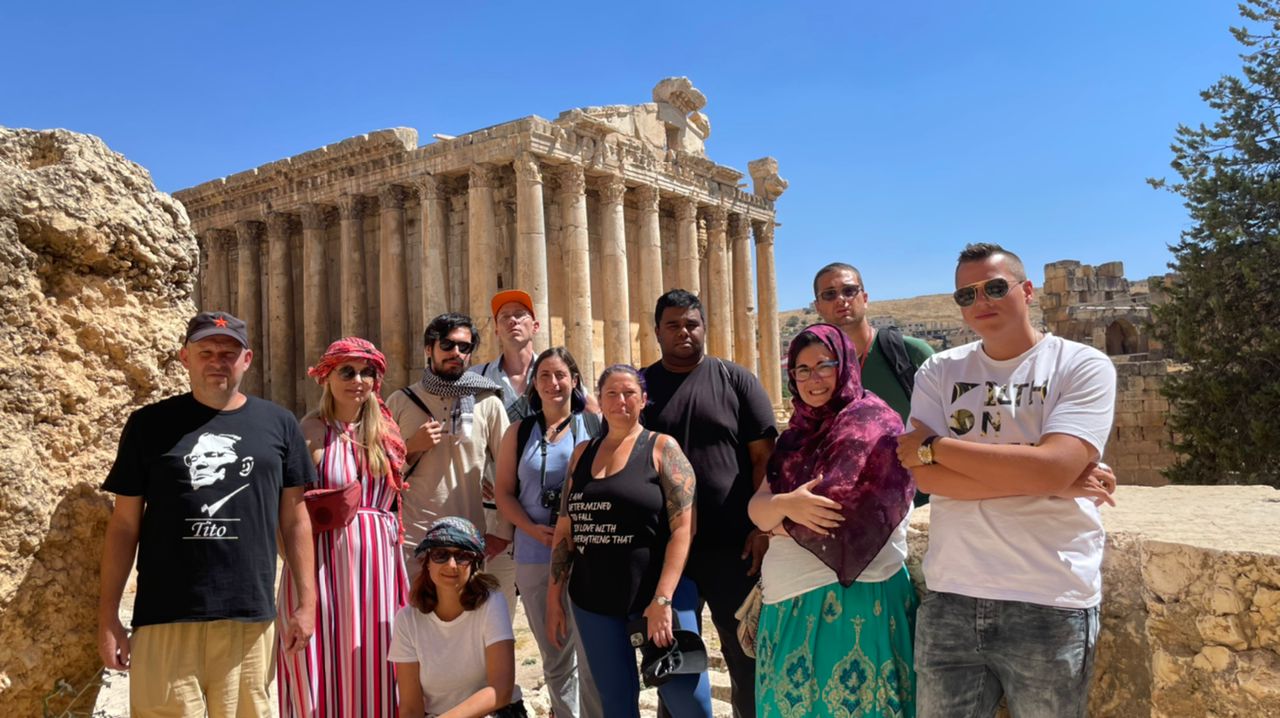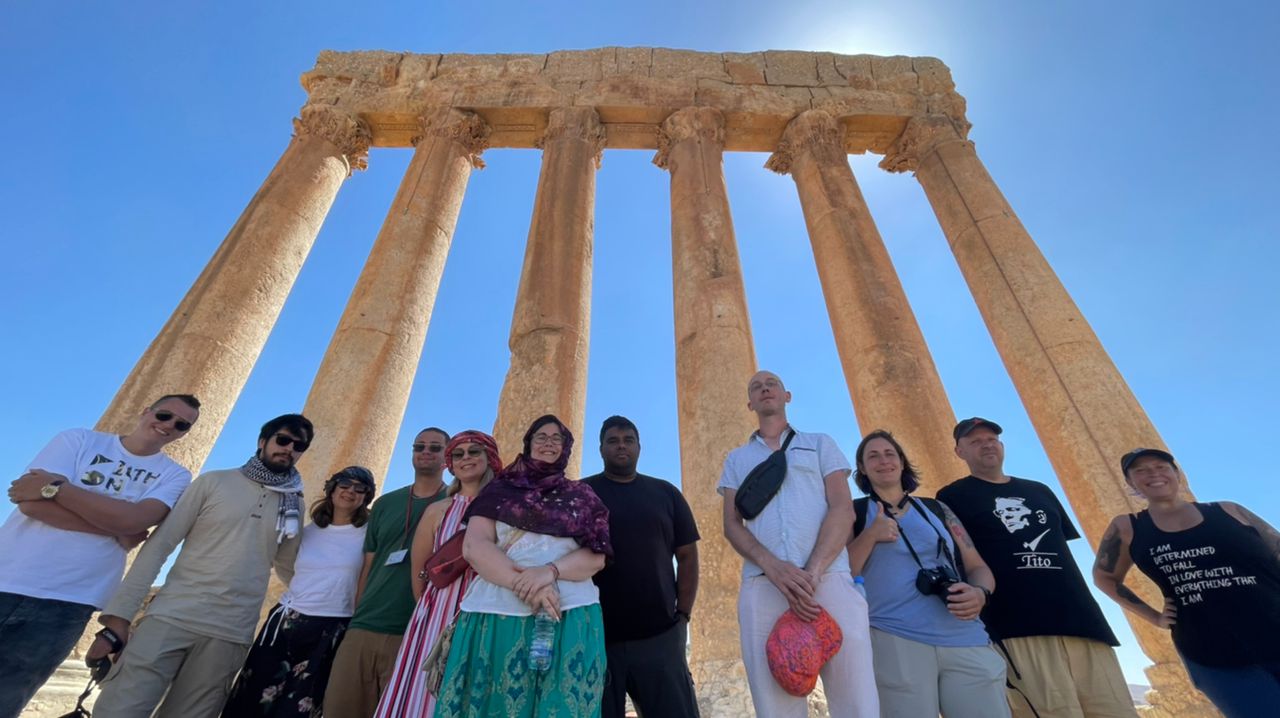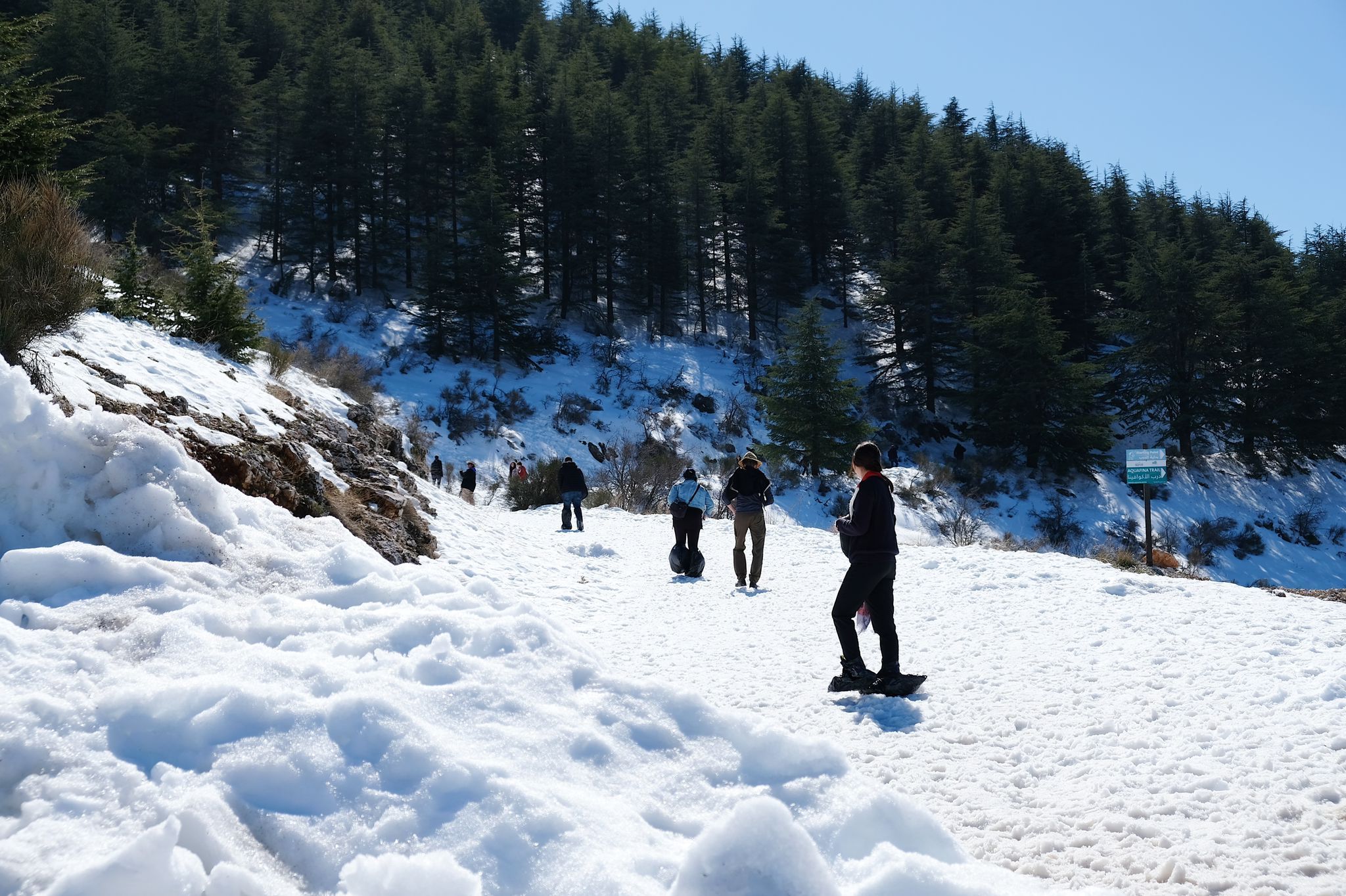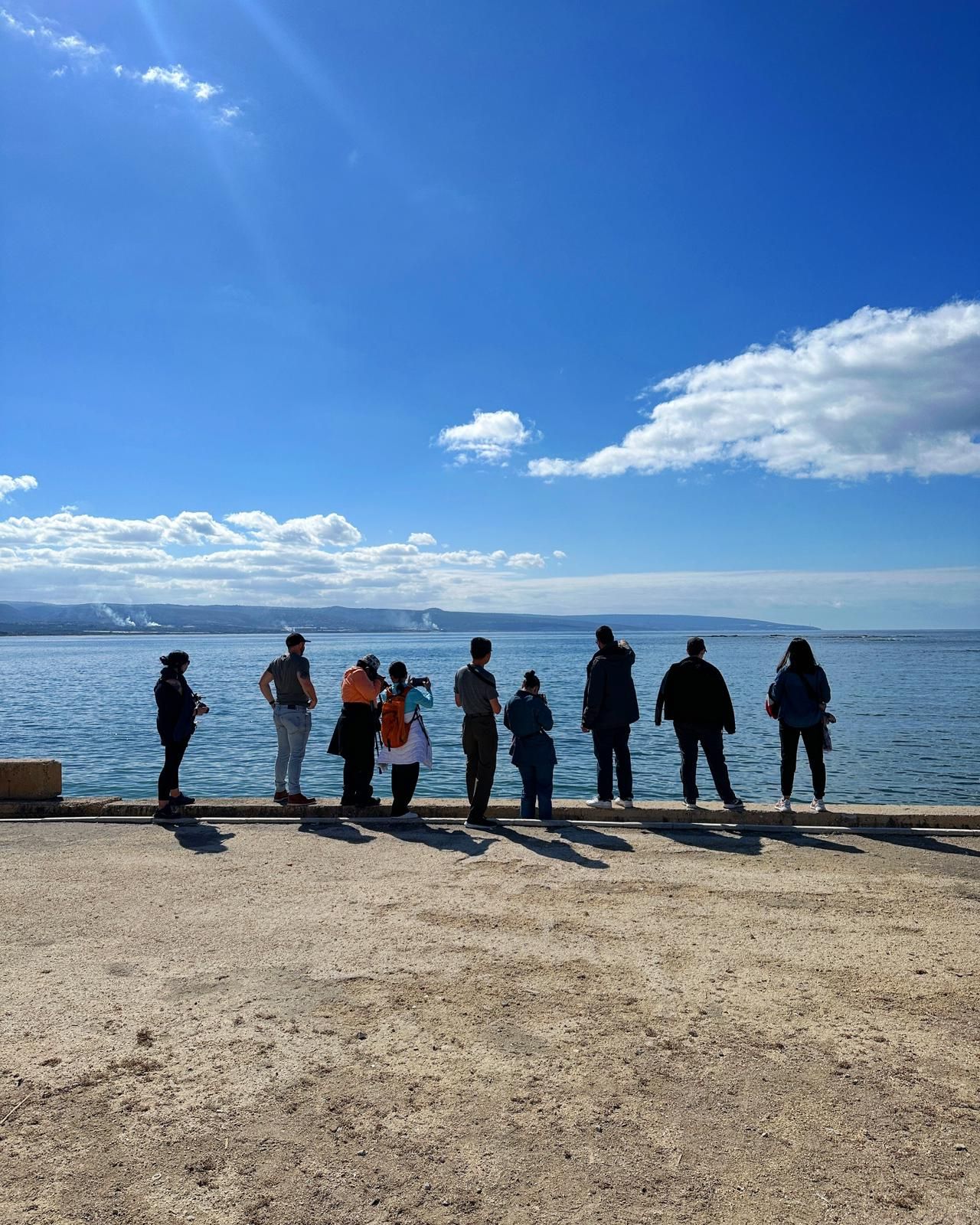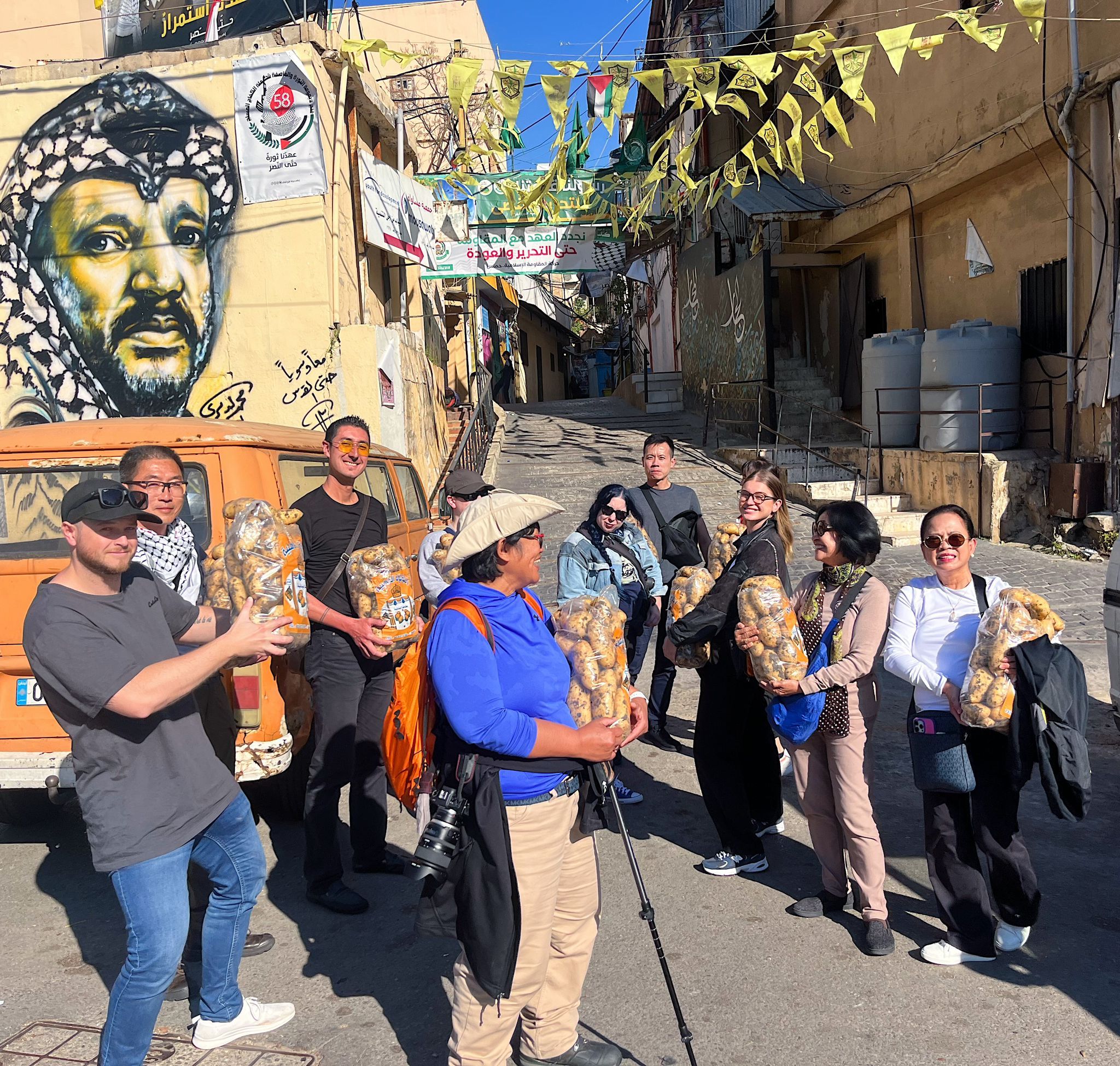YPT Tours to Lebanon
Young Pioneer tours are proud to present our Lebanon tours for 2025 and 2026. The country of Lebanon is one of the most diverse and ancient countries in the Middle East and the world, and among our favourite!
In Lebanon, the true spectrum of human history can be seen. From ancient Phoenician ports, to religious diversity, and to remnants of its brutal civil war, Lebanon has so many fascinating sides to its story.
GROUP TOURS TO LEBANON
Lebanon Spring Tour February 16th-20th, 2025 – $845
This tour takes you to see the best that Lebanon has to offer, including ancient ruins, up-and-coming nightlife scene, and the hard-to-reach city of Baalbek. It is perfectly combined with our Syria Spring tour.
Lebanon Revolutionary Tour April 27th- May 1st 2025 – $845
In typical YPT style, we explore Lebanon, revolutionary style! As the most diverse Middle Eastern Countries in one of the most politically tense regions of the world, Lebanon has been no stranger to revolution and conflict. This tour combines perfectly with our Syrian Revolutionary Tour.
Unseen Lebanon Tour August 8th-12th 2025 – $845
With more than 7000 years of human history, Lebanon is absolutely full of sites to see. On this tour, we’ve curated the best “unseen” destinations to get a truly in-depth look into this fabulous country. This tour combines perfectly with our Syria Marmarita Tour Carnival.
Ultimate Lebanon Tour September 8th-12th 2025 – $845
Ruins, wine, politics, and more! Explore all that Lebanon has to offer in a truly ultimate way. This tour combines with our Syria September tour.
All of our Lebanon tours can be combined with a Syria tour, which runs either before or after the Lebanon tour. Check out our upcoming Syria tours here.
INDEPENDENT TOURS TO LEBANON
If a group tour does not fit your calendar or if you require something more specific for yourself or you group, then YPT can arrange a bespoke Lebanon tour for you.
Prices depend on the number of people and what level of accommodation you require, but YPT can arrange everything you need for a perfect independent tour to Lebanon.
Private tours to Lebanon can also be combined with trips to other places in the region, such as Syria, Jordan, or Cyprus. The following is our sample independent itinerary for Lebanon tours. This can be done in its entirety, adapted, or combined with other destinations, such as Syria, to create your perfect bespoke Middle East Tour.
Example of a Lebanon itinerary (4 days)
Day 1 – Beirut, Lebanon – Jounieh
- Arrive at your convenience into Beirut – the capital city and most populated city in Lebanon which is well connected from many countries.
- Begin the tour with a walk downtown to learn more about the politics, financial crisis, civil war, and the mass protests that brought down the government (Lebanese Revolution).
- Explore the port where the blast occurred on August 4th 2020. It was caused by a fire on a storage facility containing ammonium nitrate and resulted in one of the largest non-nuclear explosions in the world.
- Take a stroll down Zeituna Bay and Ain Mraisseh to visit the most expensive district in Lebanon and talk civil war, politics, and view the assassination spot of Prime Minister Rafic Hariri on Feb 14th 2005.
Afternoon
- Visit the Shatilla Palestinian refugee camp – it is still the largest Palestinian refugee camp in the world. It can only be done with special permission prior.
- Visit the small charming village of Deir El Kammar where the Ottoman ruling princes ruled Lebanon.
- Explore the Beiteddine Palace – a masterpiece of 19th century Lebanese architecture, it was home to one of the latest ruling princes. Today it is Lebanese tradition that the president goes and stays there a couple of nights annually as a summer vacation.
- Enjoy a 1 hour hike around Al-chouf cedar reserve – the largest nature reserve in Lebanon making it 5% of all Lebanese territory. The Lebanese cedar is an import symbol and is featured on the Lebanese national flag. The importance of cedar wood goes back to the Phoenician times, where they used cedar wood to build the best fleet of trading ships.
Day 2 – Jeita – Harissa – Byblos
- Start your day with the Mystical Jeita grottos. The caves were discovered in 1836 by an American missionary while on a hunting expedition looking for wild boars. His discovery of the lower cave lead to the subsequent discovery of the upper caves approximately 100 years later. The caves were voted as a finalist in the new seven world wonders of nature competition. You’ll explore the upper caves by foot and lower caves by boat.
- We’ll then head to Jounieh where you’ll take the cable car to Harissa – here the statue of Our Lady of Lebanon sits. Religious stuff aside, there you will be able to find one of the nicest views in Lebanon. To add a little adventure to your journey you will have the option to pay on the spot and paraglide back down.
Afternoon
- Begin making our way to Byblos which claims to be one of the oldest continuously inhabited cities in the world – over 9000 years. Here you will see the Byblos Crusader Castle, the surrounding Phoenician archaeological sites, Roman archaeological sites, the old souk which has been modernized, and finally the Phoenician Harbor.
- Check into the Ariram Hotel
- Head to Finiqia for dinner – one of the best restaurants in Lebanon in our humble opinion.
- Byblos is famous for its relaxed vibes and cool beach side bar culture, so we will go check it out!
Day 3 – Baalbek – Anjar – Chateau Rayak
Morning
- We now head for a true trip highlight and one of the more difficult places to get to in Lebanon – Baalbek
- Explore Baalbek where you’ll see the Stone of the pregnant woman – one of many gigantic stones used in building the temples of Baalbek. Situated inside a Roman quarry a few kilometres away from the temples of Baalbek, the stone of the pregnant woman weighs a whopping 1,000 tons and held the title as the world’s largest hand carved limestone block up until 2014; when a second stone behind it was discovered. The weight of the new stone which is partly excavated is 1,673 tons!
- After viewing the megaliths in the quarry and comprehending the effort that went into building the three Roman temples: the temples of Venus (Goddess of Love Beauty and Fertility), Bacchus (the God of wine and parties), and Jupiter (God of all Gods). The Temple of Jupiter is the world’s largest ever-built Roman temple, with the world’s largest Roman Columns – only 6 Columns remain standing today.
Afternoon
- Lunch and feast on the famous lamb meat pies of Baalbek.
- We’ll meet with the local wine maker Elias of Chateau Rayak – this will give you the chance to taste 7 different wines and Arak (the national drink of the levant).
- Visit the Ruins of Anjar – These ruins belong to Umayyad Caliphate with its development started at the beginning of the 8th century. The Umayyads were headquartered in Damascus and wanted to expand their sphere of influence into the Bekaa Valley by building this new city on the crossroads of an important trade route. Since then the city became deserted and fell to ruins.
Day 4 – Tyre – Mleeta – Sidon – Beirut
Morning
- Breakfast in hotel and make our way to Tyre to explore the beautiful port area and enjoy breathtaking coastal views of the Mediterranean Sea.
- Whilst here we’ll check out two different Roman sites – the Roman Hippodrome and necropolis.
- Explore the Beautiful columned roads, aqueducts and water reservoirs, and the remains of roman baths.
- Trip highlight: We visit the Mleeta Touristic Landmark – an open-air museum dedicated to the commemoration of the fallen Hezbollah militants during the Lebanese Israeli War in 2006. You will meet a member of Hezbollah and he will share with you a local view of the conflict and politics of the militia in Lebanon, a view often times ignored over the Israeli narrative – also known as the Hezbollah Disneyland.
- We then carry on driving to the coastal city of Sidon
Afternoon
- Lunch at the best felafel restaurant by the sea in Sidon!
- Head to the Sidon Sea Castle – a 13th century crusader castle, one of many crusader castles in Lebanon that served as military outposts during in the attempted conquest of the holy city of Jerusalem. The Mamluks were ex-slaves freed under Islamic rule and fought on behalf of the Islamic faith.
- Visit the Souks of Sidon – one of the last remaining traditional and historical marketplaces in Lebanon. The rise of real-estate prices has caused many of these historical markets to be closed down. We’ll stop by a soap museum to learn about the importance of soap in Lebanese history, followed by a traditional palace; the Debbane Palace.
- Make our return to Beirut which will take just over an hour where we check into the Beirut Gems Hotel.
- Seeing as we are in the legendary Hamra part of Beirut we will make the last night extremely special
- Our first port of call will be dinner at the T-Marabouta Restaurant, not only with great dishes, but also local Lebanese wine.
- We then do a trip highlight, the best bar in Beirut – it’s not just a communist “themed” pub, but literally an actual communist one. More Soviet kitsch and AK 47’s than you can shake a stick at!
BESPOKE LEBANON TOURS
We do not list all of our bespoke Lebanon itineraries, but can offer some examples, such as the following which can be arranged into a personalized tour of Lebanon:
Lebanon Cultural Tour – explore the bustling markets of Beirut, ancient ruins of the Phoenicians and the Umayyad Dynasty, the famous Muslim mosques and Christian monasteries, and meet with locals throughout the country as you understand this ancient and fascinating culture. Explore the historic souks of Tripoli and Beirut, hunting for unique handicrafts and antiques. Attend a traditional Dabke dance performance or a concert by the Lebanese National Orchestra.
Ancient Lebanon Tour – take advantage of our independent tours which are truly unique catered to your requirements. We can arrange for you to see as many of Lebanon’s archaeological sites as your heart desires. Combine Baalbek and Byblos with a visit to the Tripoli Citadel and the Sidon Sea Castle to learn about the Phoenician and Roman civilizations.
Combined Syria Tour – we can arrange an itinerary from that explores both Lebanon and Syria. After exploring all that Lebanon has to offer, you can cross the border and travel to Damascus, where you can explore all that Lebanon’s neighbour has to offer.
Culinary Tour of Lebanon – Lebanese food is often ranked among some of the best in the world. Therefore, why not try a culinary tour of Lebanon? You can explore the vibrand restaurant scene or take a cooking class in Beirut and learn how to make some classic Lebanese dishes, such as kibbeh (meatballs) and tabbouleh (salad with bulgur wheat, parsley, and mint).
Wine Tour of Lebanon – Travel to the Bekaa Valley, known for its vineyards and wineries, visit wineries and sample some of the local wines and arak. Thanks to our contact, YPT can also arrange for some volunteer work in wineries.
Lebanon Photography Tour – The Lebanese are known for their outstanding hospitality, and the country is generally open to photography and is excited to be presented in a new light. We can create a bespoke itinerary for all your media needs.
Contemporary Lebanon Tour – This bespoke itinerary looks at Lebanon with a modern perspective, exploring the social, political, and economic realities that shape this dynamic country. In Beirut, explore neighbourhoods impacted by the civil war, like Gemmayze, and learn about reconstruction efforts. Take a walking tour focused on Beirut’s vibrant street art scene. Visit a UN Refugee Agency (UNHCR) registration center or a local NGO that supports refugees to learn about the challenges refugees face and the humanitarian efforts underway.
Frequently asked questions about travel to Lebanon
Our Lebanese tour guides speak English, French, and Arabic. For independent tours to Lebanon, guides speaking other languages can be arranged. Additionally, all of our tours are curated by our expert YPT staff with years of experience in the region, and many of our tours are led by western YPT guides who also speak Arabic or French and specialize in the region.
It is important to note that Lebanon strictly bans any traveller who has evidence of previous travel to Israel in their passport. If you have an Israeli stamp or visa, the stamp of a border crossing between Israel and Egypt or Jordan, you will be denied entry to Lebanon. In this case, it is essential to apply for a new passport before traveling to Lebanon.
Traveling to Lebanon today is one of the best ways that everyday people can help keep the economy afloat. By bringing foreign currency into the country, it can help communities weather through the current economic crisis.
Because of this, US dollars are often much preferred to Lebanese pounds, as they hold their value much more.
We recommend brining all of the money that you will need in US dollars, Euros, or GBP. By exchanging them on the black market (with the help of your YPT guide), you will get a much better exchange rate.
The rate of exchange fluctuates daily, and you can check the daily exchange rate here.
It is uncertain exactly what percentage of the country is Christian versus Muslim, as no census has been conducted since 1932. This has been done in order to prevent political and social unrest, as an official census would lead for calls for political change by underrepresented religious groups.
In practicality, this means that Lebanon is more liberal than other Middle Eastern countries, as there is a balance of power between different groups within the country. While some Lebanese are devoutly religious (both Christians and Muslims), there are also many non-religious or non-practicing individuals.
Because of the mix of religions and religious conservatism, public displays of affection, regardless of one’s sexuality, are frowned upon. We advise all participants, whether homosexual or heterosexual, to restrain from public displays of affection out of respect for the culture.
LGBTQ travellers can safely travel in Lebanon, and it is important that all travellers maintain common sense in restraining public displays of affection. You can always ask your YPT guide if you have any specific questions about what you can and cannot do in Lebanon.
Gallery
